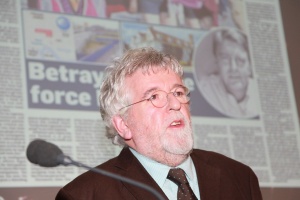Difference between revisions of "Michael Gillard"
(Delete David Hunt image) |
(→Untouchables: "Untouchables - Dirty cops, bent justice and racism in Scotland Yard" published in 2004) |
||
| Line 17: | Line 17: | ||
:''[[The Guardian]]'' has been told that an influential group within the Royal Society has set up what appears to be a "rebuttal unit" to push a pro-biotech line and counter opposing scientists and environmental groups.<ref>[http://www.theguardian.com/science/1999/nov/01/gm.food "Pro-GM food scientist 'threatened editor'"]</ref> | :''[[The Guardian]]'' has been told that an influential group within the Royal Society has set up what appears to be a "rebuttal unit" to push a pro-biotech line and counter opposing scientists and environmental groups.<ref>[http://www.theguardian.com/science/1999/nov/01/gm.food "Pro-GM food scientist 'threatened editor'"]</ref> | ||
| − | == | + | =="Corruption squad under fire"== |
| − | On 4 March 2000, ''[[The Guardian]]'' published an article by [[Laurie Flynn]] and Michael Gillard about [[Scotland Yard]] headlined "Corruption squad under fire".<ref>[http://www.theguardian.com/uk/2000/mar/04/1 "Corruption squad under fire"]</ref> Editor [[Alan Rusbridger]] soon came under intense high-level pressure from the [[Metropolitan Police]], culminating in a letter dated 2 August 2000 from [http://en.wikipedia.org/wiki/Andy_Hayman Commander Andy Hayman], and made the editorial decision not to publish further articles on the subject of police corruption. The two journalists refused to be silenced, however, and published their book "Untouchables - Dirty cops, bent justice and racism in Scotland Yard" | + | On 4 March 2000, ''[[The Guardian]]'' published an article by [[Laurie Flynn]] and Michael Gillard about [[Scotland Yard]] headlined "Corruption squad under fire".<ref>[http://www.theguardian.com/uk/2000/mar/04/1 "Corruption squad under fire"]</ref> Editor [[Alan Rusbridger]] soon came under intense high-level pressure from the [[Metropolitan Police]], culminating in a letter dated 2 August 2000 from [http://en.wikipedia.org/wiki/Andy_Hayman Commander Andy Hayman], and made the editorial decision not to publish further articles on the subject of police corruption. The two journalists refused to be silenced, however, and published their book "Untouchables - Dirty cops, bent justice and racism in Scotland Yard" four years later.<ref>[https://bristle.wordpress.com/2012/06/10/michael-gillard-on-bent-cops-the-untouchables-investigative-journalism-and-the-guardian-2001/ "Michael Gillard on bent cops, the ‘Untouchables’, investigative journalism and The Guardian (2001)"]</ref> |
==References== | ==References== | ||
<references/> | <references/> | ||
Revision as of 09:27, 12 June 2015
Michael Sean Gillard (born 1967) is an award-winning British investigative journalist who in 2013 was named "Journalist of the Year" and awarded "Investigation of the Year".[1]
Because of security concerns after exposing gangster David Hunt in the Sunday Times, Michael Gillard was advised not to attend the awards ceremony. Instead Gillard's friend and journalistic collaborator Laurie Flynn accepted the award on his behalf – dedicating it in part to the whistleblowers from inside the police and elsewhere who come forward to tell the truth in the public interest.[2]
Gillard is the son of former Observer investigative journalist Michael Gillard. "He's a chip off the old block," says one ex-colleague, who describes him as focused, secretive and aspiring to the Woodward and Bernstein school of journalism.[3] Like his colleague Laurie Flynn, Michael Gillard is a World In Action alumnus, and worked on a documentary examining BP's Colombian security operations.[4]
The Connection
On 28 November 1998, The Independent reported on The Guardian's investigation into "The Connection", an award-winning Carlton documentary about the drugs trade which the newspaper claimed was a fake. A Hard News special on Channel 4 this evening corroborates the newspaper's central allegations against "The Connection", but questions the prominence The Guardian gave to the investigation, and the way in which it was conducted.
- Hard News accuses The Guardian of adopting a "high moral tone ... as it set itself up as a watchdog of television". But, the programme continues, the paper "did not always live up to its own professed high standards".
- Chief among The Guardian's alleged sins appears to have been an aggressive interviewing technique deployed by the reporters Michael Sean Gillard and Laurie Flynn on "The Connection"'s producer, Marc de Beaufort.[5]
Safety of GM foods
On 1 November 1999, The Guardian published an article by Laurie Flynn and Michael Gillard on the safety of GM foods:
- The editor of one of Britain's leading medical journals, the Lancet, says he was threatened by a senior member of the Royal Society, the voice of the British science establishment, that his job would be at risk if he published controversial research questioning the safety of genetically modified foods.
- Richard Horton declined to name the man who telephoned him. But the Guardian has identified him as Peter Lachmann, the former vice-president and biological secretary of the Royal Society and president of the Academy of Medical Sciences.
- The Guardian has been told that an influential group within the Royal Society has set up what appears to be a "rebuttal unit" to push a pro-biotech line and counter opposing scientists and environmental groups.[6]
"Corruption squad under fire"
On 4 March 2000, The Guardian published an article by Laurie Flynn and Michael Gillard about Scotland Yard headlined "Corruption squad under fire".[7] Editor Alan Rusbridger soon came under intense high-level pressure from the Metropolitan Police, culminating in a letter dated 2 August 2000 from Commander Andy Hayman, and made the editorial decision not to publish further articles on the subject of police corruption. The two journalists refused to be silenced, however, and published their book "Untouchables - Dirty cops, bent justice and racism in Scotland Yard" four years later.[8]
References
- ↑ "Michael Gillard scoops Journalist of the Year at second annual British Journalism Awards"
- ↑ "Journalist of the Year Michael Gillard unable to attend London events after exposing gangster"
- ↑ "Super sleuths"
- ↑ "BP hands 'tarred in pipeline dirty war'"
- ↑ "C4 castigates 'Guardian' investigation"
- ↑ "Pro-GM food scientist 'threatened editor'"
- ↑ "Corruption squad under fire"
- ↑ "Michael Gillard on bent cops, the ‘Untouchables’, investigative journalism and The Guardian (2001)"
